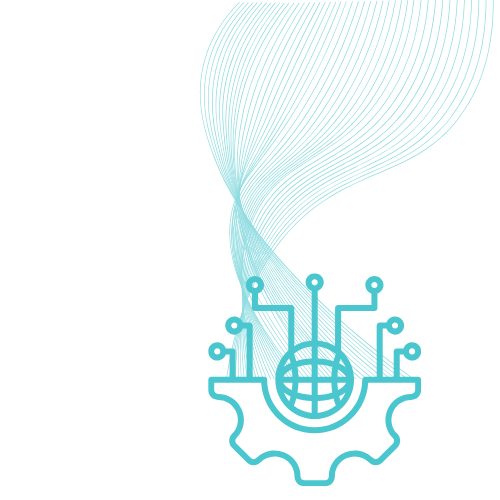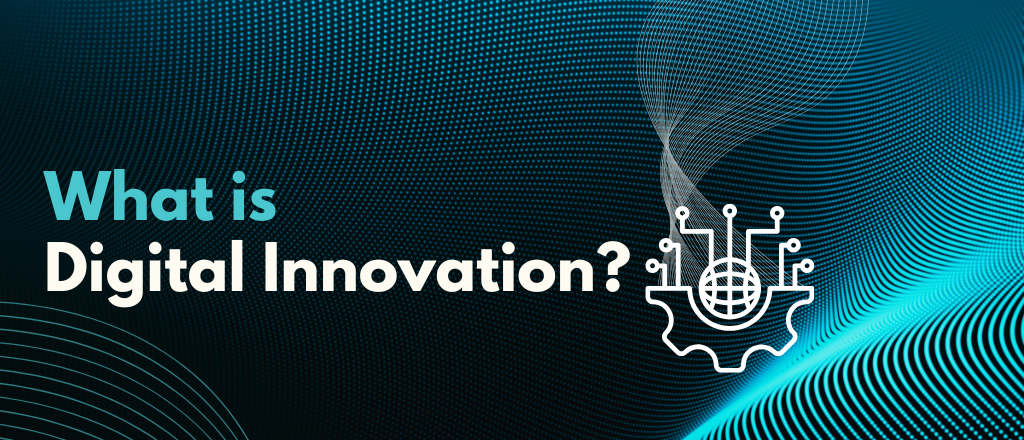Digital innovation is more than just an industry buzzword- it’s a powerful process changing entire industries. From the farms that feed us to the technologies that protect us, digital transformation is enhancing competitive advantage and adaptability across critical sectors.
Define Digital Innovation
Digital innovation is the application of advanced digital technologies and methodologies to redefine products, services, and processes. It focuses on AI, IoT, and cloud platforms to transform businesses, enhance customer experiences, and deliver measurable value.
This transformation isn’t limited to just upgrading infrastructure—it’s about using digital tools to create entirely new ways of delivering value. For example, companies are now enhancing existing products and services by integrating mobile applications, developing personalized offerings, and exploring innovative business models that didn’t exist a decade ago.
Consider how digital innovation enables:
- Mobile-Driven Services: Organizations launch apps that let customers access services on-the-go, streamlining everything from insurance quotes to food delivery.
- Personalization: Businesses use data and AI to tailor recommendations, making experiences unique for every user.
- Rapid Product Development: Low-code platforms and agile methodologies empower teams to quickly design and release new features or products, meeting customer needs faster than ever.
Ultimately, digital innovation is about reimagining what’s possible, using technology to deliver smarter, faster, and more personalized solutions—all while staying competitive in a rapidly evolving marketplace.
Digital Innovation vs. Digital Transformation: What’s the Difference?
While “digital innovation” and “digital transformation” are often used interchangeably, they represent distinct yet complementary concepts—think sparks and engines working together to power change.
Digital innovation is the creative leap—the “aha!” moment that introduces a novel technology, application, or process. It’s the fresh idea or inventive solution that pushes the boundaries of what’s possible, like using artificial intelligence to predict equipment failures or deploying IoT sensors to reduce water waste in agriculture. At its core, digital innovation is about crafting something new that delivers value by reimagining a product, service, or workflow.
Digital transformation, on the other hand, is the holistic journey that organizations embark on to embed these innovations throughout their entire operation. It’s not just about adopting a single piece of technology; it’s about rethinking culture, strategy, and processes to fully harness the benefits of digital advancements. For example, when a company implements a new AI-powered customer service platform, true transformation means integrating it into team training, updating internal policies, and aligning the technology with long-term business goals.
In short:
- Digital innovation is the original idea or solution that leverages technology for improvement.
- Digital transformation is the comprehensive process of integrating those innovations to drive broad organizational change.
Both are essential to staying resilient and competitive, but understanding the distinction allows leaders to better strategize and prioritize initiatives.
How Digital Innovation Differs from Digital Transformation
Though often used interchangeably, digital innovation and digital transformation each play a unique role in reshaping industries. The main difference lies in their scope and strategic intent.
Digital innovation centers on introducing new technologies—think artificial intelligence, IoT sensors, or blockchain—into specific products, services, or processes. Organizations may implement innovative solutions like predictive maintenance in manufacturing, or AI-powered chatbots in customer support, to quickly address specific challenges or seize new opportunities. These initiatives are typically targeted, focused, and limited in scale, driving measurable improvements without necessarily altering the entire organizational framework.
Digital transformation, on the other hand, is the more comprehensive journey. It involves weaving technology deep into a company’s core—from operations and workflows to business models and culture. Transformation requires a long-term commitment: organizations rethink how they deliver value, interact with customers, and compete in their markets. Examples might include a global retailer overhauling its supply chain with integrated digital platforms, or a hospital reimagining patient care with data-driven decision-making at every step.
To sum up:
- Digital innovation is about experimenting with and applying emerging technologies to achieve specific results, often as fast, targeted wins.
- Digital transformation is a strategic, organization-wide reinvention, guided by a long-term vision for change.
Both are crucial, and often digital innovation acts as a catalyst—providing the momentum organizations need to embark on the broader transformation journey.
How Digital Innovation Transforms Industry
Across diverse industries like Food and Beverage, Aerospace, Defense, Energy, and MedTech, advanced technologies are breaking traditional boundaries. Artificial intelligence, the Internet of Things (IoT), and blockchain are essential tools for competitive advantage.
In the Food and Beverage sector, digital solutions are revolutionizing how businesses grow, distribute, and manage food resources. Precision agriculture uses data-driven insights to optimize crop yields, while intelligent supply chain technologies ensure sustainability and efficiency.
Aerospace and Defense utilize digital innovations to power autonomous systems and robust cybersecurity solutions. These technologies aren’t just improving existing processes—they’re creating entirely new capabilities that were unimaginable just a decade ago.
The Energy sector hopes to transform smart grids and seamless renewable energy integration, promising a more sustainable and responsive power infrastructure.
MedTech is experiencing a revolution through AI-driven diagnostics and personalized healthcare solutions that can predict, prevent, and treat diseases with unprecedented precision.
Who Is Digital Innovation For?
Digital innovation is not limited to one type of business or industry. It’s for every organization looking to remain competitive, resilient, and profitable in a rapidly changing world. The impact isn’t just at the organizational level—every department, from HR and marketing to operations and finance, can leverage digital tools to drive transformation. The days when application development was exclusively the domain of IT are long gone. With the rise of intuitive, low-code platforms and user-friendly digital solutions, business users across functions now have the power to create modern applications and automate workflows to meet their unique needs.
What ties these industries together is a common thread: digital innovation as a catalyst for efficiency, adaptability, and groundbreaking progress. As we look to the future, one thing is clear: organizations that embrace digital innovation will not just survive but thrive in an increasingly complex and interconnected world.
What ties these industries together is a common thread: digital innovation as a catalyst for efficiency, adaptability, and groundbreaking progress. As we look to the future, one thing is clear: organizations that embrace digital innovation will not just survive but thrive in an increasingly complex and interconnected world.
On the other hand, those that hesitate to adopt emerging technologies run the risk of falling behind—or even becoming obsolete. Consider the fate of Blockbuster, whose reluctance to pivot toward video streaming allowed competitors like Netflix to redefine the market and ultimately led to Blockbuster’s decline. This example underscores the importance of keeping pace with technological change; innovation isn’t just an option, it’s a necessity for continued relevance and growth.

Key Benefits of Embracing Digital Innovation
Digital innovation empowers businesses to achieve unparalleled agility, leveraging real-time, data-driven insights to make informed decisions quickly and confidently. By streamlining operations, enhancing productivity, and fostering stronger vendor and customer relationships through seamless collaboration tools, companies can unlock new levels of efficiency. From predictive analytics to automation, digital innovation drives smarter workflows, improves resource management, and opens the door to continuous improvement, ensuring organizations stay resilient and competitive in an ever-evolving market.
A critical—but often overlooked—aspect of digital innovation is optimizing back-office processes. The effectiveness of a new application is rooted in the strength of the workflows and systems supporting it. Digitizing these internal processes not only heightens efficiency and reduces support costs but also accelerates response times and elevates customer satisfaction.
Key benefits of digitizing back-office operations include:
- Automation of complex workflows: Reduce manual tasks, minimize errors, and free up your team for higher-value work.
- Faster reporting and smarter decision-making: Enable leaders at every level to access timely insights, empowering more proactive business choices.
- Greater workforce empowerment: Equip employees with tools for mobility and flexibility, resulting in improved collaboration and productivity.
Consider the example of Zurich Insurance, which leveraged agile digital workflows to process 63,000 life insurance quotes in a single year—demonstrating how innovation on the inside can yield transformative results on the outside.
Ultimately, digital innovation is the foundation for scalable growth and long-term success, positioning organizations to adapt, outperform, and deliver lasting value.
Why End-to-End Solutions Matter in Digital Innovation
End-to-end solutions are a cornerstone for organizations aiming to harness the full potential of digital innovation. Rather than juggling a fragmented patchwork of disconnected tools and applications, an integrated approach ensures all systems work together seamlessly. This unified strategy eliminates manual redundancies and reduces operational costs by streamlining processes from start to finish.
A holistic solution also removes barriers to automation, enabling teams to boost productivity and respond swiftly to changing demands. With data flowing freely across departments, security protocols can be enforced consistently, safeguarding sensitive information while minimizing vulnerabilities.
Ultimately, adopting end-to-end digital solutions allows organizations to scale confidently. As projects and operations expand, businesses benefit from simplified integration, enhanced collaboration, and the flexibility to innovate without worrying that underlying technology will unravel under pressure.
The Advantages of Low-Code Platforms in Digital Solution Development
Low-code platforms are dramatically reshaping how organizations build and deploy digital solutions across departments. No longer limited to IT specialists, these intuitive tools empower teams in roles ranging from HR to finance to marketing to become active participants in developing business applications.
Empowering Every Department
With their user-friendly interfaces and drag-and-drop functionality, low-code solutions enable employees—even those without programming backgrounds—to create, test, and iterate apps to solve real business challenges. Teams can respond rapidly to market needs, automate workflows, or digitize manual processes, cutting down development time from months to days or even hours.
Speed, Agility, and Innovation
The impact is clear: businesses leveraging low-code platforms can launch and refine customer-facing apps, internal tools, and data-driven solutions at record speed. For example, insurance companies have used low-code to design applications that assess customer information—sometimes using innovative tech like facial recognition for rapid estimates—accelerating processes that once took weeks.
Real-World Results
By adopting low-code, organizations report:
- Accelerated Time-to-Market: New apps and services can be rolled out in a fraction of the time, allowing organizations to be first movers and quickly adapt to shifting customer expectations.
- Cost Efficiency: Low-code reduces the need for large development teams and expensive custom coding, driving down project costs and making experimentation more feasible.
- Cross-Functional Collaboration: Since non-technical staff can directly contribute to app development, digital innovation becomes a company-wide effort rather than an IT bottleneck.
- Scalable and Flexible Solutions: Low-code tools easily integrate with emerging technologies—think AI, IoT, AR/VR—making them ideal for bringing advanced capabilities into everyday business operations.
Supporting Continuous Improvement
Most importantly, low-code platforms support iterative enhancement. Teams can rapidly prototype, gather feedback, and refine solutions, ensuring apps evolve alongside market trends and user needs.
As digital innovation accelerates, low-code offers the agility, inclusivity, and technological leverage that modern enterprises need to outpace the competition and keep their digital strategies future-ready.
The Building Blocks of Digital Innovation: People, Processes, Portfolios, and Platforms
It’s easy to get swept up in high-level visions of transformation, but digital innovation always comes down to four essentials: the right people, agile processes, a balanced portfolio, and robust technology platforms. Each plays a distinct role in turning good intentions into tangible results.
People: The Heart of Innovation
Digital breakthroughs don’t happen on their own—they’re driven by curious, collaborative people with an eye for value. Start by empowering small, focused teams made up of problem-solvers who thrive on delivering impact. These early champions become catalysts for creative solutions that ripple across the entire organization.
Processes: Bringing Ideas to Life
An agile and iterative approach is critical for real progress. By breaking big aspirations into manageable experiments, businesses can pilot, test, and refine solutions without disrupting the day-to-day. Regular feedback loops mean new ideas are quickly validated, and lessons learned are rapidly applied, driving better outcomes at every stage.
Portfolios: Balancing Quick Wins with Bold Bets
A thoughtful innovation portfolio balances quick wins with visionary projects. Early successes generate momentum (“the wow factor”) and build confidence, while larger strategic initiatives help future-proof your business. This mix ensures short-term gains don’t come at the expense of long-term value.
Platforms: Powering Progress
Technology platforms serve as the engine room for innovation. Look for tools that unify your efforts—from project management and collaboration to rapid development and seamless deployment. Cloud-based environments and collaborative platforms (think: AWS, Microsoft Azure, Atlassian) can streamline teamwork, enhance visibility, and scale solutions rapidly.
By aligning people, process, portfolio, and platforms, organizations create a fertile ground for digital innovation. This foundation empowers teams to generate, test, and scale transformative ideas faster than ever, creating lasting value and positioning businesses at the forefront of their industries.
Enhancing Engagement Across the Value Chain
Convenience and connectivity are now essential—especially when it comes to engaging customers, partners, and suppliers. Many organizations are turning to digital applications to simplify these interactions, deploying portals, advisement tools, and self-service platforms that make it easier for stakeholders to connect and collaborate. For example, in the insurance industry, a recent IBM study found that while 38% of customers want virtual assistants for self-service, only 16% of companies currently offer them. Furthermore, 75% of customers expect the businesses they work with to embrace new technologies.
This gap highlights the opportunity for companies to rethink how they engage with their ecosystem. Adopting digital innovation strategies focused on customer centricity—like those pioneered by Zurich Insurance—can help businesses not only meet, but exceed, rising expectations. Whether through multi-channel approaches or next-generation digital tools, organizations that prioritize seamless engagement are better positioned to build loyalty, drive satisfaction, and turn every interaction into a competitive advantage.
From predictive analytics to automation, digital innovation drives smarter workflows, improves resource management, and opens the door to continuous improvement, ensuring organizations stay resilient and competitive in an ever-evolving market.
When considering areas for digital innovation, businesses must evaluate transformative technologies shaping the future. The Internet of Things (IoT) ecosystem connects smart devices, enabling real-time data collection, edge computing, and seamless operational insights. Artificial Intelligence (AI) and Machine Learning (ML) advance autonomous decision-making and generative technologies, underpinned by ethical frameworks. Extended Reality (XR) technologies, including augmented and virtual reality, revolutionize training, simulation, and remote collaboration. Cloud and distributed computing offer scalable, hybrid infrastructures for optimized performance, while emerging quantum computing applications unlock advanced problem-solving and enhance cybersecurity. Finally, sustainable technology innovations like green computing and energy-efficient infrastructure ensure businesses align digital growth with environmental responsibility, supporting a circular economy.
Focus Areas for a Successful Digital Innovation Strategy
To fully realize the promise of digital transformation, organizations should focus their innovation efforts across three interconnected domains:
1. Customer, Partner, and Supplier Engagement
Convenience and accessibility are at the forefront of modern engagement strategies. Digital channels—such as intuitive self-service portals, real-time advisement tools, and intelligent virtual assistants—empower customers, partners, and suppliers to interact with your business on their terms. For example, insurance companies are reimagining customer experiences with applications that offer instant quotes using facial recognition, reducing friction and accelerating decision-making. Across industries, embracing new engagement models not only increases satisfaction but also builds loyalty and trust.
2. Product and Service Innovation
Innovating products and services through digital capabilities is essential for differentiation and growth. This could mean enhancing existing offerings with smart features, launching entirely new digital-first solutions, or adopting agile development to respond rapidly to market needs. Industry leaders are using mobile applications, personalized experiences, and new business models to stay ahead. The result: products and services that are more responsive, intuitive, and aligned with evolving customer expectations.
3. Internal Systems, Processes, and Access
Behind every great customer experience is a robust, efficient internal operation. Digitizing back-office processes—through automation, optimized data access, and mobile-enabled workflows—drives efficiency, reduces costs, and improves decision-making. Agile methodologies and low-code platforms allow teams to iterate quickly, automate reporting, and empower employees with the tools they need to deliver exceptional service. Streamlined operations mean faster response times and a more adaptable organization.
By strategically innovating across these focus areas—powered by foundational technologies such as IoT, AI, XR, and cloud—businesses can achieve measurable gains in efficiency, agility, and customer satisfaction, while staying resilient in a rapidly changing landscape.
Kickstarting Digital Innovation: Laying the Groundwork for Success
So, how can organizations effectively ignite their digital innovation journey? The answer lies in building the right foundation—one that is equal parts talent, process, strategic focus, and robust technology.
Curate an Agile Innovation Team
Start with a small, nimble group of individuals who are sincerely invested in driving meaningful outcomes. Think of them as your in-house champions—problem-solvers who thrive on collaboration and bring diverse expertise to the table. Whether they come from operations, IT, or customer experience, their shared goal should be to spark and accelerate transformative ideas.
Adopt Iterative, Flexible Approaches
Rely on agile methodologies and continuous feedback loops. Rather than waiting for the “perfect” launch, focus on rolling out early prototypes, gathering feedback, and refining features through rapid development cycles. This approach not only keeps momentum high but also ensures each solution is tightly aligned with evolving business needs.
Prioritize High-Impact Opportunities
Build a balanced project pipeline by mixing quick wins with strategic initiatives. Early successes—be they an automated workflow that saves hours or a dashboard upgrade that sharpens decision-making—create enthusiasm and justify broader adoption. Meanwhile, highlighting high-value, long-term projects demonstrates how digital innovation can directly influence business growth.
Empower with Scalable Technology
Equip your team with a comprehensive digital platform that balances speed and security. Whether it’s Atlassian, Microsoft Azure, or Google Cloud, look for a solution that streamlines the application lifecycle from ideation to launch. Critical features should include project management tools, team collaboration spaces, rapid development environments, and cloud deployment capabilities.
By bringing together motivated people, agile practices, strategic focus, and the right technology, organizations set themselves up for digital innovation that genuinely moves the needle.
The Impact of Agile, Iterative Approaches on Digital Innovation
Adopting an agile, iterative methodology plays a pivotal role in fueling digital innovation across industries. Rather than making sweeping changes that risk disrupting critical business functions, agile practices encourage incremental advancements. This allows organizations to introduce new digital capabilities in manageable stages, reducing risk and keeping daily operations running smoothly.
Through rapid cycles of prototyping, testing, and refinement, teams can deliver solutions to market faster, collect meaningful user feedback, and adapt swiftly to changing demands. Each iteration provides a valuable learning opportunity, enabling continuous improvement and alignment with real-world needs. This not only accelerates time to value but also ensures that digital products and features are fine-tuned based on actual performance and user experiences.
By embracing this flexible approach, businesses cultivate a culture of experimentation and responsiveness—cornerstones for thriving in today’s dynamic, tech-driven landscape.
Low-Code Development: Accelerating Digital Innovation
Low-code development platforms are transforming the landscape of digital innovation by making it faster and more accessible for organizations to build impactful applications. Instead of relying solely on extensive coding expertise, teams can rapidly prototype, iterate, and deploy mobile and web solutions—democratizing innovation across departments.
With intuitive, drag-and-drop interfaces and seamless integration capabilities, low-code tools empower businesses to harness the power of transformative technologies like IoT, artificial intelligence, machine learning, and extended reality. For example, integrating IoT sensors into supply chain dashboards or leveraging AI-driven analytics in a customer portal becomes far less complex—and far more achievable.
By significantly reducing development timelines and lowering technical barriers, low-code platforms help organizations respond to emerging opportunities, adapt to market changes, and bring new ideas to life with unprecedented speed. This agility supports everything from process automation to custom workflow tools, fueling continuous improvement and sustainable competitive advantage.
Building a Successful Digital Innovation Strategy
So, how can organizations translate the promise of digital innovation into practical, impactful results? Developing an effective strategy requires thoughtful planning, a clear vision, and a commitment to continuous learning. Here’s a roadmap to guide the way:
1. Pinpoint Innovation Priorities
Start by identifying the core challenges and opportunities most relevant to your business. Is your focus on optimizing operational processes, enriching the customer journey, or setting your brand apart from competitors? Clarifying these goals lays the groundwork for a tailored innovation approach.
2. Assemble a Collaborative Team
Success hinges on the people behind the technology. Engage leaders committed to driving change—from C-suite champions and digital strategy officers to cross-functional teams spanning IT, operations, and front-line staff. Consider tapping external expertise when needed to accelerate adoption or bring in new perspectives.
3. Cultivate a Future-Ready Culture
Adopting new digital tools means fostering a culture that embraces experimentation and learning. Encourage open communication, upskill teams, and recognize those who champion innovation. Transformational change sticks when everyone is on board and empowered to contribute.
4. Select Scalable, Strategic Technologies
Choose solutions that align with your objectives while ensuring they can integrate seamlessly into current workflows—and grow with your business. Prioritize platforms that are secure, flexible, and user-friendly to maximize both adoption and return on investment.
5. Embrace Continuous Improvement
Digital innovation isn’t a one-time project. Establish systems to regularly review progress, gather feedback, and adapt strategies in response to evolving needs and new technological breakthroughs. Staying agile ensures your organization remains ahead of the curve.
By putting people at the center, choosing the right tools, and nurturing a culture of ongoing improvement, organizations can confidently transform bold ideas into sustained results and measurable value.
Building an Effective Digital Innovation Strategy
Crafting a successful digital innovation strategy requires more than simply adopting the latest technology—it means creating a holistic approach that aligns people, processes, and platforms with your organization’s vision for the future. Here’s how forward-thinking businesses can get there:
1. Identify Opportunities and Set Strategic Objectives
Start by pinpointing where digital transformation can deliver the greatest impact. Whether it’s refining customer experiences, enhancing internal workflows, or developing new products, clear objectives will help chart the course. Ask what differentiates your organization and consider how innovation can amplify these strengths.
2. Rally Leadership and Empower Teams
Digital innovation thrives on collaboration. Involve key stakeholders—from executive leaders to frontline teams—in shaping the vision, while ensuring you have digital champions to spearhead progress. Consider forming cross-functional innovation squads or appointing a chief innovation officer to bridge strategy and execution.
3. Cultivate an Innovation-Ready Culture
Encourage openness to experimentation and calculated risk-taking. Equip teams with ongoing training and foster an environment where adopting—rather than resisting—new digital tools and processes becomes the norm. Recognition and rewards for out-of-the-box thinking can go a long way in inspiring participation.
4. Evaluate, Select, and Scale the Right Technologies
Choose technologies that not only solve today’s challenges but can scale with your organization as it grows. Focus on compatibility and ease of integration—cloud platforms, low-code solutions, and interoperable IoT devices are often wise investments. Pilot promising tools in focused business areas, refine based on feedback, and then expand.
5. Establish Continuous Feedback and Adaptation Loops
View digital innovation as an ongoing journey, not a destination. Regularly assess outcomes, solicit feedback, and stay agile in adapting your strategy as markets and technologies shift. Embrace the mindset of perpetual improvement so innovation remains woven into your organizational DNA.
Example Case Study : IoT Integration for Smart Warehousing
A Manufacturer deployed IoT devices across its warehouses to enhance operational efficiency and boost productivity and cost savings. Areas of innovation included:
- Smart Warehouse Management- IoT sensors monitored inventory levels in real-time, reducing stockouts and overstocking issues.
- Predictive Maintenance- IoT devices flagged potential equipment issues before they occurred, minimizing downtime and optimizing productivity.
- Streamlined Logistics- IoT-enabled tracking systems ensured that deliveries were aligned with production schedules, improving overall supply chain efficiency.
Building a Culture That Champions Digital Innovation
Cultivating an environment where digital innovation thrives begins with leadership that actively encourages curiosity, experimentation, and continuous learning. Forward-thinking organizations break down silos, empower cross-functional collaboration, and celebrate both big wins and incremental improvements.
A key strategy involves investing in ongoing training and professional development. When employees have the knowledge and confidence to leverage advanced technologies, adoption becomes seamless. It’s essential to create open channels for sharing ideas—implementing innovation labs, idea portals, or regular brainstorming sessions can spark creative problem-solving company-wide.
Equally important is embracing a shift-friendly mindset. A culture that normalizes change, rewards adaptability, and provides space for feedback not only reduces resistance but inspires teams to explore new tools and approaches. When people see that new ideas are welcomed and supported, digital transformation becomes a shared mission rather than a top-down mandate.
Standardization of Digital Technologies
In the evolving landscape of digital innovation, ethical and regulatory constraints play a pivotal role in shaping responsible progress. Data governance and privacy are at the forefront, with global regulations such as the EU’s General Data Protection Regulation (GDPR) emphasizing consent, transparency, and adherence to ethical AI guidelines to ensure fairness and accountability. Equally important, interoperability standards can enable seamless cross-platform integration and foster open-source collaboration, paving the way for more accessible and scalable solutions. By addressing these critical aspects, organizations can achieve the full potential of digital technologies while maintaining trust and compliance in an increasingly interconnected world.
Risks and Pitfalls of Digital Innovation
While the rewards of digital innovation are considerable, the journey is not without its challenges. The biggest risk lies in failing to implement new technologies fully, which can result in large-scale monetary losses. Common pitfalls include:
- Applying the wrong technology: Selecting solutions that don’t align with business needs can hinder progress and waste resources.
- Lack of commitment: Failing to embrace new systems throughout the organization can leave digital initiatives stagnant.
- Insufficient process adaptation: Not updating internal workflows and standards to support new technologies can undermine effectiveness and compliance.
- Scaling challenges: Early-stage successes can falter if innovations are not scaled across the enterprise.
- Inadequate research: Insufficient due diligence on emerging technologies can lead to costly missteps.
- Underestimating costs: Hidden expenses in adoption, integration, or maintenance can derail even the most promising projects.
By proactively addressing these risks—through thorough planning, ongoing training, and continuous evaluation—organizations can capitalize on the promise of digital innovation while mitigating potential setbacks.
Standardization of Digital Technologies
In the evolving landscape of digital innovation, ethical and regulatory constraints play a pivotal role in shaping responsible progress. Data governance and privacy are at the forefront, with global regulations such as the EU’s General Data Protection Regulation (GDPR) emphasizing consent, transparency, and adherence to ethical AI guidelines to ensure fairness and accountability. Equally important, interoperability standards can enable seamless cross-platform integration and foster open-source collaboration, paving the way for more accessible and scalable solutions. By addressing these critical aspects, organizations can achieve the full potential of digital technologies while maintaining trust and compliance in an increasingly interconnected world.
Challenges of Non-Integrated and Off-the-Shelf Solutions
While digital innovation promises transformative opportunities, companies often encounter roadblocks when relying on disparate, off-the-shelf software or loosely connected third-party applications. As organizations scale, these ad hoc solutions can introduce significant complexity and inefficiencies into core operations.
Key challenges include:
- Siloed Data and Redundancy: Non-integrated systems can lead to duplicated data entries, inconsistent records, and information silos, making it difficult to maintain a single source of truth or gain holistic organizational insights.
- Limited Automation and Productivity: When platforms struggle to communicate, process automation stalls. Manual workarounds become the norm, slowing down workflows and diminishing productivity.
- Integration Hurdles: Stitching together a patchwork of apps to serve evolving business needs demands extra development effort, creates fragile dependencies, and complicates IT maintenance.
- Security Gaps: Multiple disconnected solutions increase the risk of vulnerabilities, as inconsistent security standards and permissions across platforms can expose sensitive information.
- Scaling Complications: A software stack that supports smaller operations can quickly become insufficient as the business grows, leading to bottlenecks and costly overhauls down the road.
These hurdles underscore the value of unified, end-to-end digital innovation solutions that streamline processes, minimize risk, and set the stage for future-ready, integrated growth.
The Importance of a Strategic Project Portfolio
When it comes to driving digital innovation, building a well-curated project portfolio is essential to achieving both immediate results and long-term transformation. By carefully selecting a balanced mix—quick-win initiatives alongside ambitious, high-impact projects—organizations create momentum and generate early successes that inspire confidence and buy-in across teams.
Quick wins deliver fast, tangible improvements that demonstrate the value of innovation efforts, energizing stakeholders and validating further investment. At the same time, high-value initiatives—especially those aligned with core business strategies—set the stage for deeper, organization-wide change. This thoughtful approach not only accelerates measurable benefits but also fortifies support for the broader digital transformation journey, ensuring that both operational needs and strategic objectives are met in tandem.
Navigating the Challenges of Building a Culture of Innovation
Fostering a truly innovative culture comes with its own unique set of hurdles. One of the foremost challenges is assessing an organization’s openness to change and willingness to embrace calculated risks. Often, legacy mindsets and established processes can slow momentum, as employees may feel hesitant to stray from the familiar.
Additionally, leaders must strike a careful balance: encouraging experimentation without sacrificing accountability. This means introducing clear frameworks—think innovation guardrails—that protect business interests and maintain focus while still giving teams the freedom to explore creative solutions.
Other common challenges include:
- Overcoming Resistance to Change – Longstanding habits and corporate silos can limit collaboration and dampen enthusiasm.
- Measuring Success – Unlike traditional performance metrics, gauging the impact of innovation initiatives often requires new benchmarks and a tolerance for trial and error.
- Ensuring Alignment – It’s essential that innovation efforts are aligned with core business goals to drive meaningful value.
- Maintaining Momentum – Sustained innovation requires continuous leadership support, ongoing employee engagement, and an environment that celebrates learning from setbacks.
By proactively addressing these challenges, organizations can lay the groundwork for a vibrant culture where ingenuity flourishes and transformative ideas become reality.
Conclusion
By redefining business strategies, embracing cutting-edge technologies, and cultivating a culture of continuous improvement, digital innovation empowers businesses to maximize competitive edge. It provides the framework for disruptive opportunities that enhance operational efficiency and long-term sustainability in an ever-changing market landscape.







